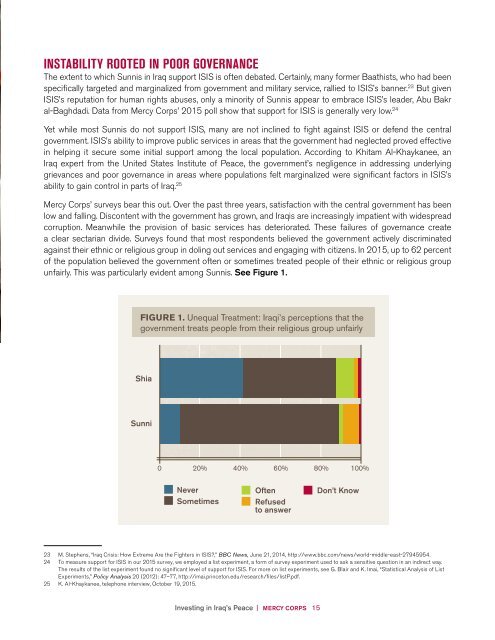INVESTING IN IRAQ’S PEACE
Investing%20in%20Iraqs%20Peace_Final%20Report
Investing%20in%20Iraqs%20Peace_Final%20Report
Create successful ePaper yourself
Turn your PDF publications into a flip-book with our unique Google optimized e-Paper software.
<strong>IN</strong>STABILITY ROOTED <strong>IN</strong> POOR GOVERNANCE<br />
The extent to which Sunnis in Iraq support ISIS is often debated. Certainly, many former Baathists, who had been<br />
specifically targeted and marginalized from government and military service, rallied to ISIS’s banner. 23 But given<br />
ISIS’s reputation for human rights abuses, only a minority of Sunnis appear to embrace ISIS’s leader, Abu Bakr<br />
al-Baghdadi. Data from Mercy Corps’ 2015 poll show that support for ISIS is generally very low. 24<br />
Yet while most Sunnis do not support ISIS, many are not inclined to fight against ISIS or defend the central<br />
government. ISIS’s ability to improve public services in areas that the government had neglected proved effective<br />
in helping it secure some initial support among the local population. According to Khitam Al-Khaykanee, an<br />
Iraq expert from the United States Institute of Peace, the government’s negligence in addressing underlying<br />
grievances and poor governance in areas where populations felt marginalized were significant factors in ISIS’s<br />
ability to gain control in parts of Iraq. 25<br />
Mercy Corps’ surveys bear this out. Over the past three years, satisfaction with the central government has been<br />
low and falling. Discontent with the government has grown, and Iraqis are increasingly impatient with widespread<br />
corruption. Meanwhile the provision of basic services has deteriorated. These failures of governance create<br />
a clear sectarian divide. Surveys found that most respondents believed the government actively discriminated<br />
against their ethnic or religious group in doling out services and engaging with citizens. In 2015, up to 62 percent<br />
of the population believed the government often or sometimes treated people of their ethnic or religious group<br />
unfairly. This was particularly evident among Sunnis. See Figure 1.<br />
FIGURE 1. Unequal Treatment: Iraqi’s perceptions that the<br />
government treats people from their religious group unfairly<br />
Shia<br />
Sunni<br />
0 20% 40% 60% 80% 100%<br />
Never<br />
Sometimes<br />
Often<br />
Refused<br />
to answer<br />
Don’t Know<br />
23 M. Stephens, “Iraq Crisis: How Extreme Are the Fighters in ISIS?,” BBC News, June 21, 2014, http://www.bbc.com/news/world-middle-east-27945954.<br />
24 To measure support for ISIS in our 2015 survey, we employed a list experiment, a form of survey experiment used to ask a sensitive question in an indirect way.<br />
The results of the list experiment found no significant level of support for ISIS. For more on list experiments, see G. Blair and K. Imai, “Statistical Analysis of List<br />
Experiments,” Policy Analysis 20 (2012): 47–77, http://imai.princeton.edu/research/files/listP.pdf.<br />
25 K. Al-Khaykanee, telephone interview, October 19, 2015.<br />
Investing in Iraq’s Peace | MERCY CORPS 15


